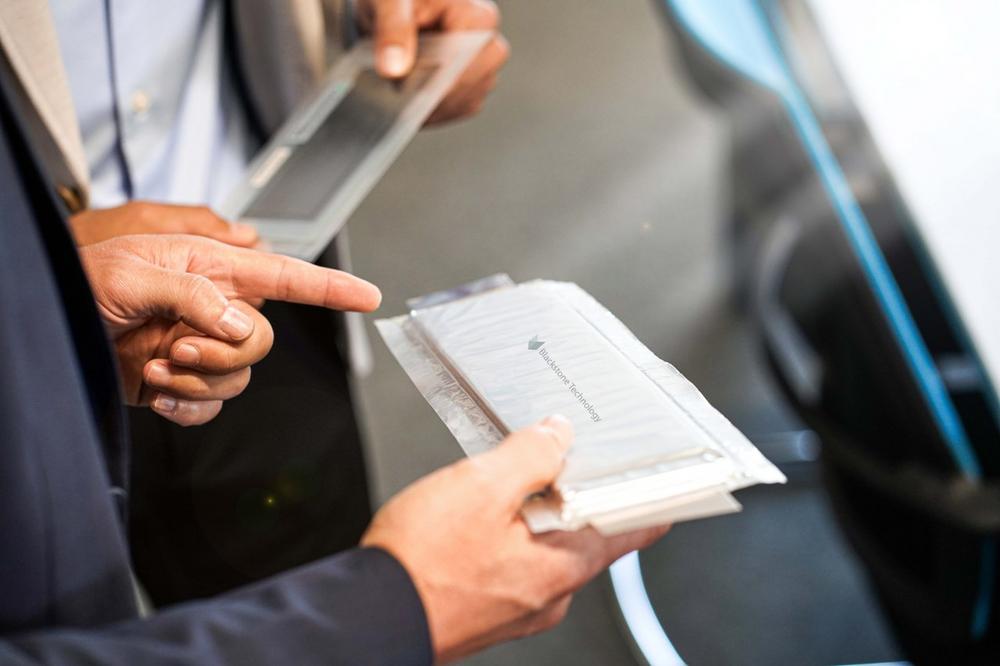This proves: Printing battery cells using Blackstone’s patented process reduces material costs by €20/kWh through better utilization of inactive materials (fewer collector foils and separators). "This result was verified and confirmed by independent experts on behalf of the funding body Innosuisse," said Yilmaz. On this basis, Innosuisse has now released another tranche of money for the project, which Blackstone will use to create further models for printing solid-state batteries. The simulation has also shown that production costs can be reduced by about 20%.
Cyclic optimization of the production process with artificial intelligence
In parallel with this validation process, Blackstone Technology has developed an artificial intelligence (AI) system with the Saxon company Symate GmbH, which will be integrated into the production of printed electrodes and battery cells by December 2021. "This will allow the mathematical models developed by BFH to be fed with data from the AI Life system for the first time," Yilmaz explains. "We can thus optimize our production processes cyclically and in real time." From the testing of battery materials to recipe selection, processing and battery cell production, all relevant parameters can thus be recorded in a system, optimized and analysed using AI predictions.
The particular advantage is that the use of AI makes interactions visible.The highly complex and data-intensive 3D printing can thus be reliably mastered even in series production. Blackstone relies on the principle of the digital twin.
Digital twin for 3D printed battery electrodes
The new Blackstone factory in Döbeln, Saxony, is all about digitalization and Industry 4.0 standard. "We want to analytically evaluate accumulating data volumes in the ongoing manufacturing process and regulate the process on the basis of this data," explains Holger Gritzka, CEO and Managing Director of Blackstone Technology GmbH in Döbeln. "For this purpose, we will use a newly developed cyberphysical production system (CPPS)." The CPPS creates a digital twin for each process of the individual energy cells based on and with the help of artificial intelligence. "Once sufficient analysed data is available, the digital twin can be ‚trained‘ to give it an individual normal behaviour," Gritzka explains. This normal behaviour is then permanently compared with ongoing production. In the event of anomalies, possible causes and correlations are then communicated or automatically corrected via a notification system.
3D printed lithium-ion batteries
The patented technology for three-dimensional printing of batteries was developed by Blackstone itself. It is suitable to produce liquid electrolyte batteries as well as solid state batteries.
With Blackstone’s special 3D printing technology and data-based technologies, production becomes not only stable, but also highly flexible (individual process design is possible regardless of framework conditions and customer-specific geometries). In addition, the energy density of the novel batteries is increased by 20%, while the manufacturing cost is reduced compared to the currently widely used lithium-ion battery technologies. At the same time, Blackstone can reduce the amount of investment by up to 70% with automated battery manufacturing using 3D printing.
"By eliminating long drying lines and toxic solvents, we can sustainably reduce energy consumption in electrode manufacturing," explains Serhat Yilmaz. "In this way, we have created a valuable basis for the future production of new solid-state or solid-state batteries that will set new standards in terms of energy density, charging speed and safety – while keeping costs and environmental impacts moderate."
Blackstone Resources is a Swiss Holding Company, with its legal domicile in Baar, Kanton Zug, and is concentrating on the battery technology and battery-metals market and offers direct exposure to the battery-technology revolution.
Presently, Blackstone Technology builds up a production-line for small series of 3D printed batteries in Döbeln, Saxony, Germany. The short-term production will be pouch-cells with the Blackstone Thick Layer Technology © which allows a 20% higher density in lithium-ion cells, Blackstone Resources continues the program of development in solid state batteries and its production process.
Electric vehicles and batteries have driven the demand for vast quantities of these metals. Therefore, Blackstone Resources sets up, develops and manages production-refineries for battery-metals such as lithium, cobalt, manganese, graphite, nickel and copper.
Blackstone Resources AG
Blegistrasse 5
CH6340 Baar
Telefon: +41 (41) 44961-63
Telefax: +41 (41) 44961-69
http://www.blackstoneresources.ch
CMO
Telefon: +41 (41) 44961-63
E-Mail: s.yilmaz@blackstoneresources.ch
![]()

